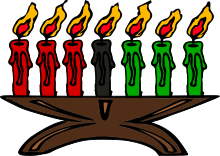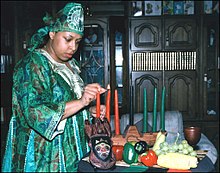「クワンザ (行事)」の版間の差分
編集の要約なし |
m 外部リンクの修正 http:// -> https:// (www.cnn.com) (Botによる編集) |
||
| (6人の利用者による、間の6版が非表示) | |||
| 1行目: | 1行目: | ||
| ⚫ |
'''クワンザ'''︵英語‥Kwanzaa︶は、主に[[アメリカ合衆国]]など[[アメリカ州]]の[[アフリカ系アメリカ人]]の間で祝われる行事。毎年12月26日から1月1日に行われ、[[アフリカ|アフリカ文化]]にちなんで、食事や贈り物が供される<ref name="Why Kwanzaa">{{Cite web|url=http://www.africanholocaust.net/news_ah/kwanzaa.html|title=Why Kwanzaa Video|publisher="[[Maulana Karenga]]"|accessdate=2016-11-3}}</ref>。クワンザには7つの基本原則があり、[[マウラナ・カレンガ]]によって提唱され、1966年に初めて行われた。
|
||
{{Otheruses|[[アフリカ系アメリカ人]]の行事|[[アンゴラ]]の通貨|クワンザ}} |
|||
| ⚫ |
'''クワンザ'''︵英語‥Kwanzaa︶は、主に[[アメリカ合衆国]]など[[アメリカ州]]の[[アフリカ系アメリカ人]]の間で祝われる行事。毎年12月26日から1月1日に行われ、アフリカ文化にちな |
||
==沿革と語源== |
|||
アメリカ人[[マウラナ・カレンガ]](ロナルド・マッキンリー・エバレット(Ronald McKinley Everett)としても知られる)が1966年に[[アフリカ系アメリカ人]]の祭日として初めて提唱した<ref name="Kwanzaa Date">{{cite news|url=https://select.nytimes.com/search/restricted/article?res=F00B1EFD395C0C738FDDAB0994DB484D81|work=[[The New York Times]]"|title=The Evening Hours|date=December 30, 1983 |accessdate=December 15, 2006 | first=Ron | last=Alexander}}</ref>。カレンガによると、クワンザという名前は[[スワヒリ語]]の言葉「マトゥンダ・ヤ・クワンザ(matunda ya kwanza、初物の果実)」が由来<ref>{{cite web|url=http://www.infoplease.com/spot/kwanzaa1.html | title = Kwanzaa – Honoring the values of ancient African cultures | author = Holly Hartman|website=Infoplease.com|accessdate=October 25, 2017}}</ref>。[[アフリカ]]からアメリカに[[奴隷貿易]]により連れて来られたアフリカ人はその大部分が[[西アフリカ]]からであったにもかかわらず、特に1960年代において、[[東アフリカ]]の言語スワヒリ語の選択は[[パン・アフリカ主義|汎アフリカ主義]]の象徴としての位置付けを反映していた<ref>{{cite web|url=https://books.google.com/books?id=1rHLyC2yHQ8C&q=Mozambique#v=snippet&q=Mozambique&f=false |title=The Atlantic Slave Trade - Herbert S. Klein - Google Books |website=Books.google.com |date=April 13, 1999 |accessdate=December 27, 2016}}</ref><ref>{{Cite book|url=https://books.google.com/books?id=zIwNCgAAQBAJ&pg=PA6|title=The Story of Swahili|last=Mugane|first=John M.|date=2015-07-15|publisher=Ohio University Press|year=|isbn=9780896804890|location=|pages=6|language=en}}</ref>。 |
|||
南アフリカでは[[冬至]]の頃の12月-1月に開催される初物祭と、[[ズールー人|ズールー族]]の収穫祭に、部分的にカレンガは着想を得た<ref>{{Cite book|url=https://books.google.com/books?id=QGCOAgAAQBAJ&pg=PA83|title=Kwanzaa: Black Power and the Making of the African-American Holiday Tradition|last=Mayes|first=Keith A.|date=2009-09-10|publisher=Routledge|year=|isbn=9781135284008|location=|pages=84|language=en}}</ref>。また、最後に﹁a﹂を追加することによって象徴的な7文字で綴ることに決めた<ref>{{Cite book|url=https://books.google.com/books?id=ZWCOAgAAQBAJ&pg=PA228|title=Kwanzaa: Black Power and the Making of the African-American Holiday Tradition|last=Mayes|first=Keith A.|date=2009-09-10|publisher=Routledge|year=|isbn=9781135284015|location=|pages=228|language=en}}</ref>。
|
|||
クワンザはまた、1960年代の「ブラック・ナショナリズム(黒人民族主義)」にその根を持った祝祭である。カレンガはアフリカ系アメリカ人にアフリカの伝統や「[[共同体主義]]のアフリカの哲学」のカレンガが言うところの「アフリカの7つの原則」を熟考することにより、再びアフリカ文化や彼らの歴史的文化資産に繋がる機会を提供した。1960年代と1970年代の「ブラックパワー運動」における重要人物カレンガにとっては、このような祝日の創設は、「暴力革命の前に文化革命が必要だ。文化革命はアイデンティティー、目的、方向性を与える」とする重要な言葉を裏付けた<ref>{{cite book |first=Keith A. |last=Mayes |year=2009 |title=Kwanzaa: Black Power and the Making of the African-American Holiday Tradition | pages=63–65 |url=https://books.google.com/books?id=Vhgk72OGBRYC&pg=PA52#v=onepage&q&f=false |isbn= 978-0415998550 |accessdate= December 27, 2015}}</ref>。 |
|||
カレンガによると、近年ではクワンザは[[クリスマス]]の代替として位置付けられているとされる。カレンガは、[[イエス・キリスト]]は[[精神病]]であり[[キリスト教]]は黒人は忌避すべき宗教である、としている<ref>Karenga, Maulana (1967). "Religion". In Clyde Halisi, James Mtume. The quotable Karenga. Los Angeles: University of Sankore Press. pp. 25. 23769.8.</ref>。クワンザが普及するに連れカレンガは意見を変えキリスト教は疎外せず、1997年には「クワンザ:家族、コミュニティー、文化の祭典」「クワンザは宗教的祭典への代替として創設されたものではない」と発言している<ref>{{cite book | first=Maulana | last=Karenga | title=Kwanzaa: A Celebration of Family, Community and Culture | page=121 | publisher=University of Sankore Press | year=1997 | isbn=978-0943412214}}</ref>。そのため多くのアフリカ系アメリカ人は、クリスマスに加えてクワンザを祝っている<ref>{{cite news| url=https://www.nytimes.com/1990/12/20/garden/in-blacks-homes-the-christmas-and-kwanzaa-spirits-meet.html?pagewanted=1 | work=The New York Times | title=In Blacks' Homes, the Christmas and Kwanzaa Spirits Meet | first=Lena | last=Williams | date=December 20, 1990 | accessdate=May 7, 2010}}</ref>。 |
|||
== 原則とシンボル == |
== 原則とシンボル == |
||
| 18行目: | 26行目: | ||
}}</ref><ref name = "clinton1997">{{cite news |
}}</ref><ref name = "clinton1997">{{cite news |
||
|title = Clinton offers holiday messages |
|title = Clinton offers holiday messages |
||
|url = |
|url = https://edition.cnn.com/ALLPOLITICS/1997/12/23/message/ |
||
|publisher = CNN |
|publisher = CNN |
||
|date = 1997-12-23 |
|date = 1997-12-23 |
||
| 29行目: | 37行目: | ||
|date = 1998-12-26 |
|date = 1998-12-26 |
||
|accessdate = 2007-12-24}}</ref>。 |
|accessdate = 2007-12-24}}</ref>。 |
||
{{clear}} |
|||
== 脚注 == |
== 脚注 == |
||
| 39行目: | 49行目: | ||
{{US-stub}} |
{{US-stub}} |
||
{{Africa-stub}} |
{{Africa-stub}} |
||
{{Normdaten}} |
|||
{{デフォルトソート:くわんさ}} |
{{デフォルトソート:くわんさ}} |
||
[[Category:アフリカ系アメリカ人の文化]] |
[[Category:アフリカ系アメリカ人の文化]] |
||
[[Category:12月の記念日]] |
[[Category:12月の記念日]] |
||
[[Category:ブラック・パワー]] |
|||
2023年10月13日 (金) 16:31時点における最新版
沿革と語源[編集]
アメリカ人マウラナ・カレンガ︵ロナルド・マッキンリー・エバレット︵Ronald McKinley Everett︶としても知られる︶が1966年にアフリカ系アメリカ人の祭日として初めて提唱した[2]。カレンガによると、クワンザという名前はスワヒリ語の言葉﹁マトゥンダ・ヤ・クワンザ︵matunda ya kwanza、初物の果実︶﹂が由来[3]。アフリカからアメリカに奴隷貿易により連れて来られたアフリカ人はその大部分が西アフリカからであったにもかかわらず、特に1960年代において、東アフリカの言語スワヒリ語の選択は汎アフリカ主義の象徴としての位置付けを反映していた[4][5]。 南アフリカでは冬至の頃の12月-1月に開催される初物祭と、ズールー族の収穫祭に、部分的にカレンガは着想を得た[6]。また、最後に﹁a﹂を追加することによって象徴的な7文字で綴ることに決めた[7]。 クワンザはまた、1960年代の﹁ブラック・ナショナリズム︵黒人民族主義︶﹂にその根を持った祝祭である。カレンガはアフリカ系アメリカ人にアフリカの伝統や﹁共同体主義のアフリカの哲学﹂のカレンガが言うところの﹁アフリカの7つの原則﹂を熟考することにより、再びアフリカ文化や彼らの歴史的文化資産に繋がる機会を提供した。1960年代と1970年代の﹁ブラックパワー運動﹂における重要人物カレンガにとっては、このような祝日の創設は、﹁暴力革命の前に文化革命が必要だ。文化革命はアイデンティティー、目的、方向性を与える﹂とする重要な言葉を裏付けた[8]。 カレンガによると、近年ではクワンザはクリスマスの代替として位置付けられているとされる。カレンガは、イエス・キリストは精神病でありキリスト教は黒人は忌避すべき宗教である、としている[9]。クワンザが普及するに連れカレンガは意見を変えキリスト教は疎外せず、1997年には﹁クワンザ‥家族、コミュニティー、文化の祭典﹂﹁クワンザは宗教的祭典への代替として創設されたものではない﹂と発言している[10]。そのため多くのアフリカ系アメリカ人は、クリスマスに加えてクワンザを祝っている[11]。原則とシンボル[編集]

習慣[編集]

